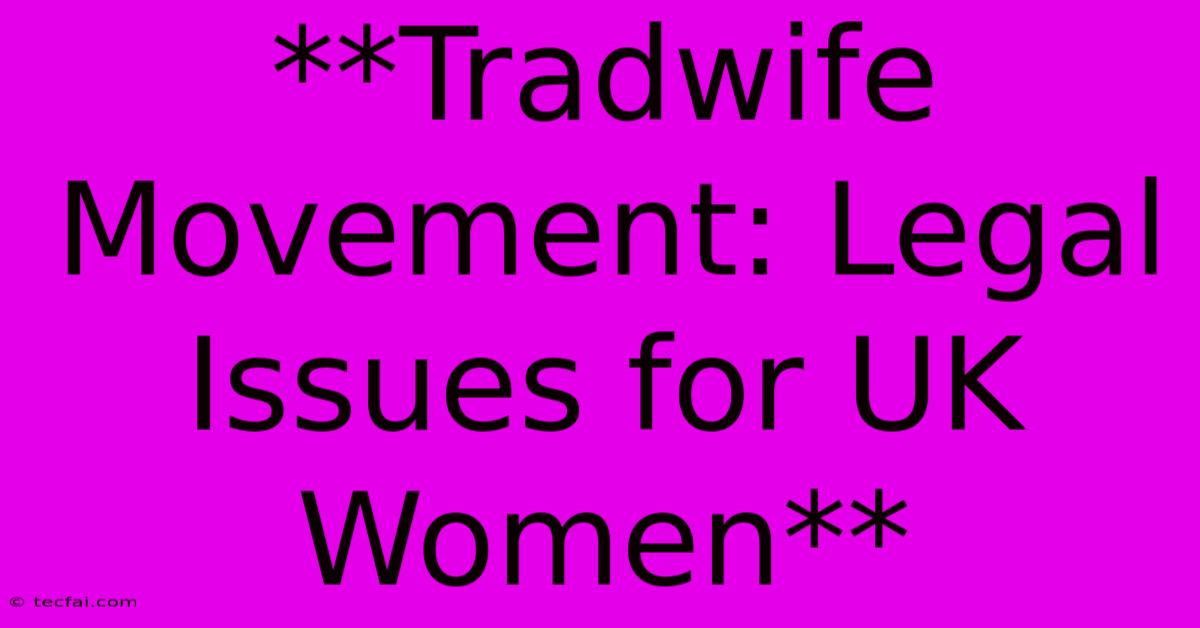**Tradwife Movement: Legal Issues For UK Women**

Discover more detailed and exciting information on our website. Click the link below to start your adventure: Visit Best Website tecfai.com. Don't miss out!
Table of Contents
Tradwife Movement: Legal Issues for UK Women
The "tradwife" movement, advocating a return to traditional gender roles within marriage, is gaining visibility, prompting crucial discussions about its potential legal implications for women in the UK. While the movement champions a specific lifestyle choice, it's essential to understand how this choice intersects with existing UK law, particularly concerning financial independence, property rights, and domestic abuse. This article explores the key legal areas where UK tradwives might face challenges.
Financial Dependence and Economic Vulnerability
A core tenet of the tradwife lifestyle is often the wife's dependence on her husband's financial support. This raises concerns about economic vulnerability. While not illegal in itself, this dependence can have significant repercussions in several situations:
Divorce and Separation:
In the event of divorce or separation, a financially dependent wife may face significant challenges securing a fair settlement. UK divorce law considers financial contributions of both spouses, including those made indirectly through childcare or homemaking. However, proving the economic value of such contributions can be complex. A tradwife who has forgone career advancement to focus on the home may find it difficult to demonstrate sufficient financial contribution to secure a substantial share of assets. Seeking independent legal advice during a marriage is crucial, especially if one spouse is significantly less financially independent than the other.
Domestic Abuse:
Financial dependence can significantly exacerbate the risks and consequences of domestic abuse. A woman wholly reliant on her husband for financial support may find it exceedingly difficult to leave an abusive relationship. Lack of financial independence can limit her options and make her more vulnerable to control and coercion. Access to resources and support for victims of domestic abuse is vital and should be sought immediately if needed.
Property Rights and Ownership
The distribution of property and assets within a marriage is another area requiring careful consideration. While joint ownership is common, some tradwife arrangements might see properties registered solely in the husband's name. This setup creates legal complications should the marriage end. It's essential for women to understand their rights regarding property ownership, even if they are not actively involved in the financial management of those assets. Pre-nuptial agreements, though not always enforceable, can offer some clarity regarding asset distribution in the event of a separation.
Employment and Career Opportunities
The tradwife lifestyle often involves foregoing or limiting career opportunities. While this is a personal choice, it’s important to recognize the potential long-term consequences. If the marriage dissolves, re-entering the workforce after a significant career break can be challenging, affecting earning potential and pension rights. Women considering this lifestyle should carefully weigh the potential long-term economic consequences.
The Importance of Legal Advice
The tradwife movement presents unique challenges when viewed through a legal lens. While embracing a traditional lifestyle is a personal choice, it's crucial for women to be fully aware of their legal rights and protections. Seeking independent legal advice before entering into, or during, a marriage, particularly one involving a significant disparity in financial contribution or career paths, is highly recommended. This advice can help ensure they are adequately protected in various scenarios, from divorce proceedings to dealing with potential domestic abuse situations.
Conclusion
The tradwife movement, while raising societal questions about gender roles, requires careful consideration of the potential legal implications for women in the UK. Financial dependence, property rights, and the impact on future career prospects all raise significant legal and practical concerns. By understanding these potential challenges and seeking appropriate legal advice, women can make informed decisions that safeguard their future well-being and financial security.

Thank you for visiting our website wich cover about **Tradwife Movement: Legal Issues For UK Women** . We hope the information provided has been useful to you. Feel free to contact us if you have any questions or need further assistance. See you next time and dont miss to bookmark.
Featured Posts
-
Palm Bay Residents Hear Rotc Training
Nov 14, 2024
-
Sara Sharif Case Fathers Guilty Admission
Nov 14, 2024
-
Margot Robbie Tom Ackerley Welcome Baby
Nov 14, 2024
-
Trump Forms Group With Musk Ramaswamy
Nov 14, 2024
-
Truck Over Bank Residents Evacuated
Nov 14, 2024
